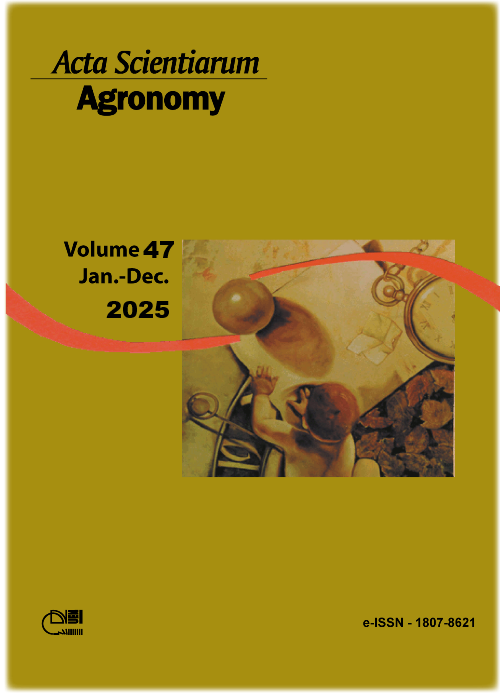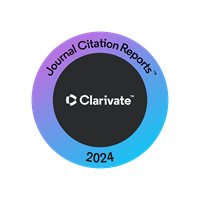Yield of creole corn under the residual effect of leguminous plants in the northeastern semi-arid region
Resumo
Agroecological production systems require profitable edaphic management strategies; therefore, the adoption of leguminous plants has become a strategy for improving nutrient cycling and straw input in the soil for subsequent crops. The objective of this study was to evaluate dry matter production and nutrient levels in leguminous plants grown alone and their effects on maize grown in succession in an agroecological production system. We conducted field experiments in two harvests under a randomized block design with eight treatments and three replicates. The treatments used were mulch, Mucuna pruriens, Mucuna pruriens (L.) DC., Dolichos lablab, Cajanus cajan, control (soil without vegetation cover), Crotalaria juncea, and Canavalia ensiformis. At the end of flowering, approximately 67 days after sowing (DAS), plants were collected and deposited in the soil as cover and fertilizer. The production of dry matter and nutritional content (nitrogen (N), phosphorus (P), and potassium (K)) in the agricultural fertilizers were analyzed, followed by the sowing of corn after this deposition as a form of residual fertilization. C. juncea produced the maximum amount of straw dry matter of 15,000 kg ha-1, with a high N content (32.2 g kg-1) but low K content (0.3 g kg-1). Black velvet showed high K content (3.4 g kg-1), and M. pruriens (MPL) showed high P content (3.0 g kg-1). Production parameters were determined on a large scale using C. juncea and C. ensiformis, with average values of 3,380 kg ha-1. The incorporation of green leguminous manures (sun hemp and jack bean) resulted in better yields in maize production components (ear length, ear diameter, number of rows, mass of 100 grains, and productivity) owing to the high accumulation of aerial phytomass and high N uptake under local conditions.
Downloads
Referências
Ambrosano, E. J., Salgado, G. C., Otsuk, I. P., Patri, P., Henrique, C. M., & Melo, P. C. T. (2018). Organic cherry tomato yield and quality as affect by intercropping green manure. Acta Scientiarum. Agronomy, 40(1), 1-8. https://doi.org/10.4025/actasciagron.v40i1.36530
Andrade, B. M. S., Pedrotti, A., Sousa, B. M. L., Holanda, F. S. R., Villwock, A. P. S., & Santana, A. P. S. (2023). Technical efficiency of forage production from residues of green corn (Zea mays L.) in Sergipe, Brazil. Revista Brasileira de Ciências Agrárias, 18(2), 1-12. https://doi.org/10.5039/agraria.v18i2a2971
Bihari, B., Singh, Y. K., Shambhavi, S., Mandal, J., Kumar, S., & Kumar, R. (2022). Nutrient use efficiency indices of N, P, and K under rice-wheat cropping system in LTFE after 34th crop cycle. Journal of Plant Nutrition, 45(1), 123-140. https://doi.org/10.1080/01904167.2021.1943674
Companhia Nacional de Abastecimento [CONAB]. (2023). Acompanhamento da safra brasileira de grãos. https://www.conab.gov.br/info-agro/safras/graos
Dahal, B., & Ghosh Bag, A. (2023). Effect of integrated nutrient management on different parameters of lentil: A review. Communications in Soil Science and Plant Analysis, 54(8), 1015-1023. https://doi.org/10.1080/00103624.2022.2137188
Deguchi, S., Uchino, H., Uozumi, S., Touno, E., & Morita, S. (2022). The inorganic nitrogen fertilizer equivalency of hairy vetch (Vicia villosa Roth) as a winter green manure in Kanto and Tohoku district, Japan. Soil Science and Plant Nutrition, 68(2), 268-274. https://doi.org/10.1080/00380768.2022.2037392
Empresa Brasileira de Pesquisa Agropecuária [EMBRAPA]. (1997). Serviço nacional de levantamento e conservação de solos. Manual de métodos de análise de solos (2. ed.). Embrapa.
Guan, P., Wang, R., Nkoh, J. N., Shi, R., Pan, X., Li, J., & Xu, R. (2022). Enriching organic carbon bioavailability can mitigate soil acidification induced by nitrogen fertilization in croplands through microbial nitrogen immobilization. Soil Science Society of America Journal, 86(3), 579-592. https://doi.org/10.1002/saj2.20400
Harindintwali, J. D., Zhou, J., Muhoza, B., Wang, F., Herzberger, A., & Yu, X. (2021). Integrated eco-strategies towards sustainable carbon and nitrogen cycling in agriculture. Journal of Environmental Management, 293, 112856. https://doi.org/10.1016/j.jenvman.2021.112856
Lai, H., Gao, F., Su, H., Zheng, P., Li, Y., & Yao, H. (2022). Nitrogen distribution and soil microbial community characteristics in a legume–cereal intercropping system: a review. Agronomy, 12(8), 1-15. https://doi.org/10.3390/agronomy12081900
Liu, S., Ma, Z., Zhang, Y., Chen, Z., Du, X., & Mu, Y. (2022). Astragalus sinicus incorporated as green manure for weed control in corn. Frontiers in Plant Science, 13(829421), 1-13. https://doi.org/10.3389/fpls.2022.829421
Lyu, H., Li, Y., Wang, Y., Wang, P., Shang, Y., Yang, X., Wang, F., & Yu, A. (2024). Drive soil nitrogen transformation and improve crop nitrogen absorption and utilization-a review of green manure applications. Frontiers in Plant Science, 14, 1-15. https://doi.org/10.3389/fpls.2023.1305600
Madembo, C., Mhlanga, B., & Thierfelder, C. (2020). Productivity or stability? Exploring maize-legume intercropping strategies for smallholder Conservation Agriculture farmers in Zimbabwe. Agricultural Systems, 185, 102921. https://doi.org/10.1016/j.agsy.2020.102921
Mangaravite, J. C. S., Passos, R. R., Andrade, F. V., Silva, V. M. D., Marin, E. B., & Mendonça, E. D. S. (2023). Decomposition and release of nutrients from species of tropical green manure. Revista Ceres, 70(3), 114-124. https://doi.org/10.1590/0034-737X202370030012
Martyniuk, S., Pikuła, D., & Kozieł, M. (2019). Soil properties and productivity in two long-term crop rotations differing with respect to organic matter management on an Albic Luvisol. Scientific Reports, 9(1878), 1-9. https://doi.org/10.1038/s41598-018-37087-4
Naz, A., Rebi, A., Naz, R., Akbar, M. U., Aslam, A., Kalsom, A., Niaz, A., Ahmad, M. I., Nawaz, S., Kausar, R., Ali, B., Saleem, M. H., & Zhou, J. (2023). Impact of green manuring on health of low fertility calcareous soils. Land, 12(3), 1-13. https://doi.org/10.3390/land12030546
Nunes, R. L. C., Neto, F. B., Lima, J. S. S. D., Chaves, A. P., Silva, J. N. D., & Santos, E. C. D. (2020). Effect of green manuring with Merremia aegyptia on agro-economic efficiency of radish production. Revista Caatinga, 33(4), 964-973. https://doi.org/10.1590/1983-21252020v33n411rc
Oliveira, A. D., Saito, M. A., Baleroni, A. G., Matsuzaki, R. A., Bertagna, F., Colevate, A. T. K., Scapim, C. A., & Guimarães, L. S. A. (2022). Methods of inoculation of plant growth-promoting rhizobacteria in specialty maize genotypes under organic agriculture system. Acta Scientiarum. Agronomy, 44(1), 1-9. https://doi.org/10.4025/actasciagron.v44i1.54910
Panday, D., Bhusal, N., Das, S., & Ghalehgolabbehbahani, A. (2024). Rooted in nature: The rise, challenges, and potential of organic farming and fertilizers in agroecosystems. Sustainability, 16(4), 1-25. https://doi.org/10.3390/su16041530
Parenti, A., Cappelli, G., Zegada-Lizarazu, W., Sastre, C. M., Christou, M., Monti, A., & Ginaldi, F. (2021). SunnGro: A new crop model for the simulation of sunn hemp (Crotalaria juncea L.) grown under alternative management practices. Biomass and Bioenergy, 146, 1-16. https://doi.org/10.1016/j.biombioe.2021.105975
Rodríguez-Espinosa, T., Papamichael, I., Voukkali, I., Gimeno, A. P., Candel, M. B. A., Navarro-Pedreño, J., Zorpas, A. A., & Lucas, I. G. (2023). Nitrogen management in farming systems under the use of agricultural wastes and circular economy. Science of the Total Environment, 876, 1-15. https://doi.org/10.1016/j.scitotenv.2023.162666
Santos, W. P., Silva, M. L. N., Avanzi, J. C., Acuña-Guzman, S. F., Cândido, B. M., Cirillo, M. Â., & Curi, N. (2021). Soil quality assessment using erosion-sensitive indices and fuzzy membership under different cropping systems on a Ferralsol in Brazil. Geoderma Regional, 25, e00385. https://doi.org/10.1016/j.geodrs.2021.e00385
Silva, F. C. (2009). Manual de análises químicas de solos, plantas e fertilizantes (2. ed.). Embrapa Solos.
Silva, J. N. D., Bezerra Neto, F., Lima, J. S. S. D., Santos, E. C. D., Nunes, R. L. C., & Chaves, A. P. (2020). Production and benefits in carrot and vegetable cowpea associations under green manuring and spatial arrangements. Revista Ciência Agronômica, 51(4), 1-11. https://doi.org/10.5935/1806-6690.20200064
Solangi, F., Bai, J., Gao, S., Yang, L., Zhou, G., & Cao, W. (2019). Improved accumulation capabilities of phosphorus and potassium in green manures and its relationship with soil properties and enzymatic activities. Agronomy, 9(11), 1-16. https://doi.org/10.3390/agronomy9110708
Souza, S. S. D., Couto Júnior, P. A., Flôres, J. D. A., Coelho, A. P., & Lemos, L. B. (2022). Do the intercropping with Crotalaria spectabilis and Urochloa ruziziensis reduce the maize agronomic performance?. Pesquisa Agropecuária Tropical, 52, 1-8. https://doi.org/10.1590/1983-40632022v5270513
Copyright (c) 2025 Murilo de Sousa Almeida , Miriele Soares Oliveira, Maria Brenna Mendes Cunha, Maria de Fátima Marques Pires (Autor)

This work is licensed under a Creative Commons Attribution 4.0 International License.
DECLARAÇÃO DE ORIGINALIDADE E DIREITOS AUTORAIS
Declaro que o presente artigo é original, não tendo sido submetido à publicação em qualquer outro periódico nacional ou internacional, quer seja em parte ou em sua totalidade.
Os direitos autorais pertencem exclusivamente aos autores. Os direitos de licenciamento utilizados pelo periódico é a licença Creative Commons Attribution 4.0 (CC BY 4.0): são permitidos o compartilhamento (cópia e distribuição do material em qualqer meio ou formato) e adaptação (remix, transformação e criação de material a partir do conteúdo assim licenciado para quaisquer fins, inclusive comerciais.
Recomenda-se a leitura desse link para maiores informações sobre o tema: fornecimento de créditos e referências de forma correta, entre outros detalhes cruciais para uso adequado do material licenciado.





















































